testsetset
The video game industry is full of companies that make sequels and derivative titles. But Schell Games was started by game design professor Jesse Schell to make transformational games — or those that can change players for the better.
It’s pretty ambitious to think that a video game can change your life — like a work of art, such as a movie, a book, or a song. But Schell’s company is different, like its founder, a former circus performer and stand-up comedian who has given many entertaining speeches in his career. Schell wrote the award-winning book, The Art of Game Design: A Book of Lenses.
His company is not a normal game company, as it is based in Pittsburgh, isolated from most of the other companies in the industry. It’s not far from Carnegie Mellon University’s Entertainment Technology Center (ETC), a multidisciplinary graduate school, where Schell teaches game design.
The company building overlooks the Monongahela River, where artists can be inspired by waterfront views. Schell drew his own inspiration by working at places like Disney’s Imagineering, where he worked on early virtual reality titles. Big companies turned to Schell to work on special projects and games like Toontown Online and Pixie Hollow.
“From early on, we established ourselves as a studio that was really about doing powerful creative work,” Schell said. “We’ve done both design and engineering and art, the whole package, for a long time. It can be very exciting when you work with big partners.”
But the company is moving into its own original work as well. Schell Games has grown to more than 100 employees, making titles, such as the virtual reality game I Expect You To Die and the chemistry educational title Happy Atoms. I visited Pittsburgh this week and toured Schell Games and interviewed Schell. We talked about the game industry in Pittsburgh, his company, and his views on virtual reality, augmented reality, and educational games.
Here’s an edited transcript of our interview.
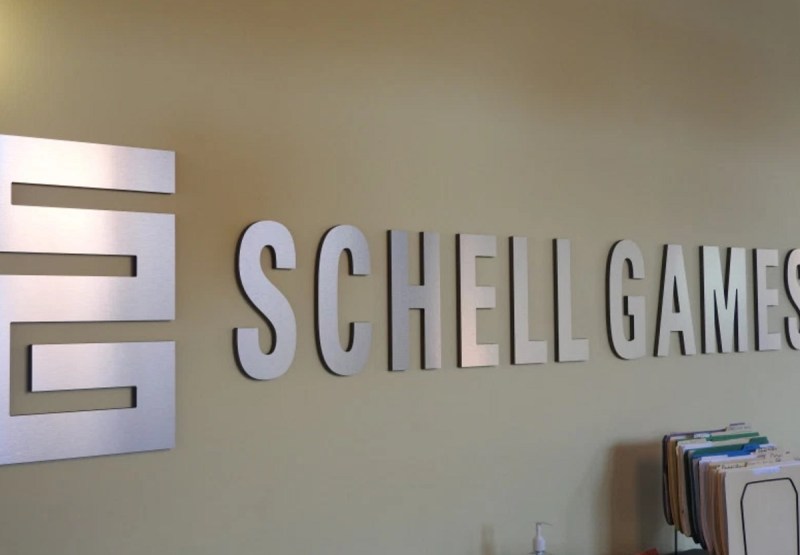
Above: Schell Games in Pittsburgh.
GamesBeat: You have about 100 people now on 10 projects at a time. How do you look at what Schell Games has become to the days when you were getting started?
Jesse Schell: In a lot of ways, it’s nicer for us to be bigger. Since we’re completely independent, without any investors, it means that the more people we have, the more people are working our own projects. That’s given us a lot more power and control. When we were smaller, there weren’t a lot of options for independent studios. We got started before the iPhone. Back then, the only option was really the DS, the handheld systems, and even that was tough.
Now, there are so many options. For us, it’s exciting to pursue VR, to pursue AR, and to pursue them not only with partners and clients but also to pursue some of these new things on our own.
GamesBeat: It looked like a lot of your history was working closely with big project partners like Disney. Was that the way you wanted to work, or was it more just the way to survive? You guys seemed to be getting to work on some very interesting things.
Schell: Definitely. There’s a lot of people who’d really rather not be working on work for-hire projects. As a result, they do them kind of begrudgingly. Often, they’re not doing the creative part of it. But from early on, we established ourselves as a studio that was really about doing powerful creative work. We’ve done both design and engineering and art, the whole package, for a long time. It can be very exciting when you work with big partners. The opportunity to work with Lego or Disney or Google, places like that — it’s something you couldn’t do on your own. We like to have a mix of the work-for-hire projects but also to pursue our own projects.
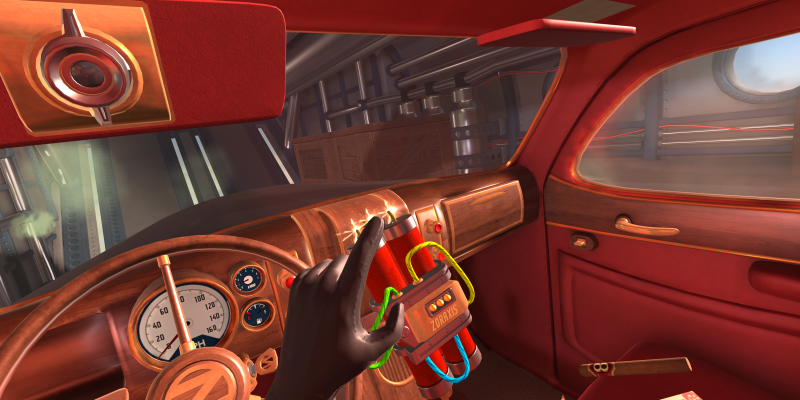
Above: I Expect You To Die is Schell Games’ VR title.
GamesBeat: How did you find them? Did they essentially find you?
Schell: Early on, I used to work at Disney. I was the creative director of the virtual reality studio back in the ‘90s. When I left Disney and came to teach at Carnegie Mellon, initially, I’d just started Schell Games as an envelope for my independent consulting. A lot of my initial work was with Disney, and it was going well. Eventually, some folks at Disney said, “If you can pull a team together, we’ll throw some larger projects your way.” I knew some people I wanted to work with, so that sounded very appealing, and we gave it a try.
The first two or three years, 2002 [to] 2005, we were largely focused on various Disney projects. As we started to grow, we took on projects from other places. We started to build our reputation and found other clients coming to us.
GamesBeat: In Pittsburgh at the time, were there any other game companies?
Schell: Back then, Demiurge was here. Demiurge and Schell Games kind of grew up side by side, and then, Demiurge moved to Boston. They were purchased by Sega a couple of years ago. Before Schell Games, there was a studio that did a title called Sanitarium that was popular back in the ‘90s, DreamForge. I found that a lot of the individuals who had been part of that company were still hanging around the area. But Pittsburgh had never been a big area for game development, even though all the talent is here. You have the artists, the engineers. Everyone is here. It’s just a matter of taking advantage of it.
GamesBeat: The game creators always seem to like waterfront views.
Schell: We have a lot of those in Pittsburgh, rivers everywhere.
GamesBeat: I always wonder why certain regions become so strong in games. It usually seems to go back to someone who just starts up where they live.
Schell: It’s always hit based. I remember I was doing a speaking engagement in Edinburgh. I got an email from a couple of people in Dundee who said, “We’re having a game festival up here, too. Can you come?” I didn’t think there was much up in Dundee. I didn’t know what to expect, but I went up there. They had this enormous game festival. Twenty local independent studios and 20 advanced student projects being demoed to thousands of people. How is this happening?
And the answer was simple: Rockstar North. Rockstar was right there. When a company has a hit, everyone nearby thinks, “I can do that, too.” That’s what I think it’s all about.
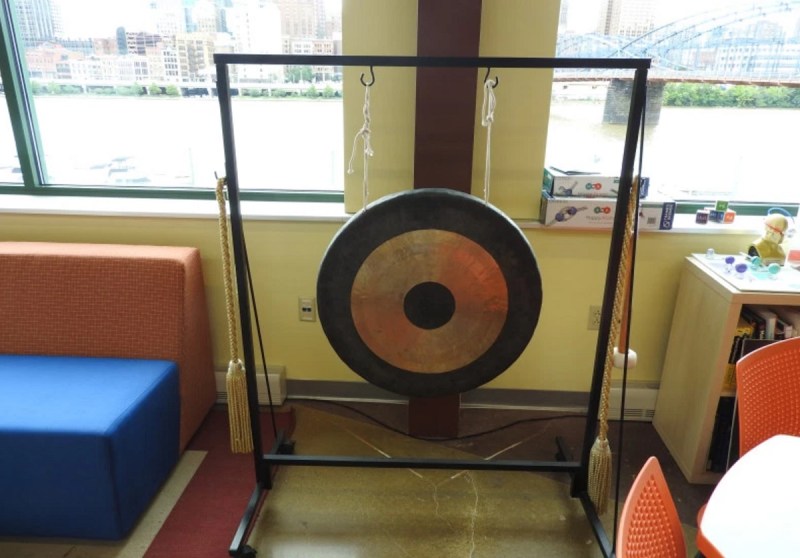
Above: The company gong at Schell Games.
GamesBeat: They spin off their people. Their employees go start their own companies.
Schell: That’s definitely part of it. But most of the folks I saw there were not spinoffs from Rockstar. They were just inspired by that success.
GamesBeat: Have you started seeing that here, where some of your people go start their own independent studios?
Schell: We’ve seen a little of that. A recent one, she didn’t stay local, Rebecca Cordingley. Maybe you’ve seen this game Ooblets that’s been talked about? They’re getting published by Double Fine. She’d been with us and decided she wanted to go off and work independently.
GamesBeat: It’s how Silicon Valley got started. The “traitorous eight” who left William Shockley.
Schell: Right. We haven’t had too much of that. We have very low turnover, which is nice.
GamesBeat: You should be more tyrannical, like Shockley. Silicon Valley might start up here.
Schell: I never thought about it that way. Maybe I’m harming the region by having such a stable company. But the big change for us lately is we’ve seen a lot of these external companies start to build what they’re doing here. Disney Research has a team of about 50 here. Google has a significant facility. Oculus now has an R&D lab here. Apple’s opened something up. When we lose people, that’s where we lose them. We just lost one to Uber. Uber has a big facility here.
GamesBeat: We have another project at a conference about tech in the heartland, basically tech outside of Silicon Valley. Finding interesting stories about different regions that are popping up because Silicon Valley is becoming impossible to live in. It’s like Manhattan.
Schell: The joke about Pittsburgh is that it’s both the westernmost East Coast city and the easternmost Midwest city — plus the northernmost southern city and the southernmost Canadian city. But one thing that is nice, the costs here are much lower. You saw our studio. The average age is probably 29. More than 50 percent of them own their own houses, which I don’t think would be true out in Silicon Valley.

Above: Schell Games’ Happy Atoms title teaches chemistry.
GamesBeat: They’d all be living with multiple roommates. A lot of people are starting to bemoan that all the indie companies that started in San Francisco are being forced out. They’re going to the suburbs because no one can afford rent.
Schell: When you’re independent, location just doesn’t matter much. You can be anywhere. The only thing you care about is talent, and there’s good talent in a lot of places.
GamesBeat: They said about half of your people are from Carnegie Mellon?
Schell: It’s probably around there.
GamesBeat: Your region seems like it’s still very competitive. Places like Finland seem to be running out of people. Supercell has to recruit outside the country.
Schell: I got to visit there a little while ago. I met with Rovio and some folks out there. Again, it’s hit based. A couple of people have hits, and suddenly, everyone thinks they can get something going.
GamesBeat: Has much happened on the government level, where they start providing incentives or tax breaks?
Schell: Pittsburgh has long had a film tax credit. They have just, if I understand it right, passed a modification that will include game developers. At some point, that should be a help to us. For us, a more significant government thing is applying for grants. We’ve applied for and received a few different grants in the six- and seven-figure range. That’s been a help to us. The grant work is hovering around 10 [to] 15 percent of what we do. About half of what we do is education related, but only some of that is grant based.
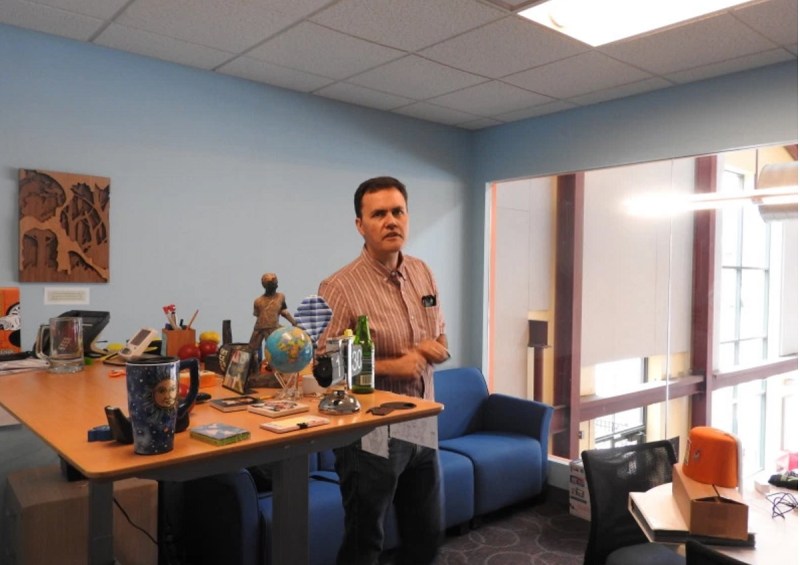
Above: Jesse Schell in his office at Schell Games.
GamesBeat: It’s an interesting niche. All the big game companies have left it to others.
Schell: We started getting into educational games about seven years ago, when we were still finding our way. We hadn’t done education much yet. People started approaching us about educational games, though, which I’d had experience with at Carnegie Mellon. I’d supervised development of a few. I remember thinking, “Why are they coming to us? Why don’t they just go to the experts in educational development, the world-class developers?” And then, I looked around and realized that there are almost none of those.
This was something we could become the best in the world at and something the team was passionate about. We thought maybe this could be a good strategy for us. We started taking those jobs more seriously, focusing more on that, and it’s worked out very well. We did a lot of work with Amplify Learning, which was a great help. They’ve had their challenges, of course. They’re doing a pivot right now. But still, that was some wonderful work for a few years. We’ve worked with the Fred Rogers Company doing the Daniel Tiger games. That’s been a great series. I think we’ve done 15 games for them now. As well as some things we’ve done on our own — the Happy Atoms project, the SuperChem VR project.
GamesBeat: How long were you thinking about Happy Atoms?
Schell: Oh, boy. In some ways, it goes back to when I was in college. As a serious project, I’d say it’s about five years. I started fooling around with it in my basement, the prototypes, and then, from there to market was about five years.
GamesBeat: It takes a long time to find the fun there?
Schell: It’s complicated. You have to make it useful. You have to make it accurate. You have to make it work. You have to figure out the technology. There’s all the business questions. With something like that, we had the physical engineering of it because it involves certain kinds of rubber and magnets. All the chemistry part of it had to be right. Then, we had all the AI algorithms, this computer vision stuff because of the way you take pictures of these toys. It has to parse what they are and figure out which of these 18,000 molecules it is. There was research on a lot of levels.
And then, of course, we had to figure out the business case that really makes sense for this. It would be easy to make some $400 toy that no one would buy, but to make something people really would buy, that would be a profitable business — there’s a lot to figure out for that. But Happy Atoms has been going pretty well. We’re very proud of it.
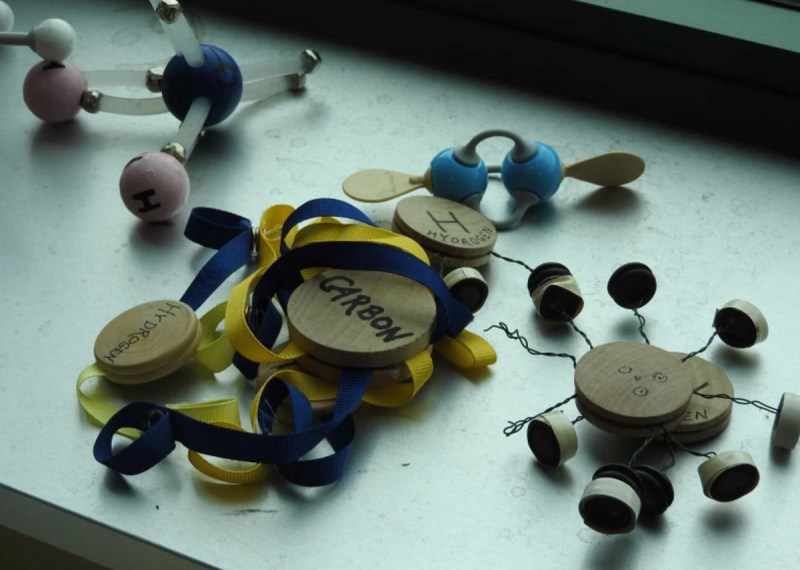
Above: Jesse Schell made prototypes for Happy Atoms for years.
GamesBeat: What would you say has been your most successful, most played game?
Schell: It’s a hard question. In some ways — I have to choose my words carefully here. Certainly some of the projects we’ve done for Disney — Pixie Hollow and some of the other projects we’ve done for them have been up in the millions of players.
GamesBeat: Toontown was very successful.
Schell: Toontown — I was the lead designer on when I was at Disney. After it launched, we did some expansions for it. We developed parts of that. But Pixie Hollow was the first MMO — we pitched that from outside the company, and it was developed almost entirely outside Disney. Some of the theme-park projects we’ve done have had really big numbers. In terms of most revenue for our independent work, I Expect You to Die for Vive and Rift and PSVR has probably been our biggest success.
GamesBeat: Was that a surprise? VR has such a small installed base right now.
Schell: It depends on how you look at it. I’d rather have five percent penetration in a small marketplace than .00001 percent, which is what so often happens in the mobile space. It’s so hard to break into the mobile space or even on Steam. You have to be lucky, have the right combination of a great game and good luck to break through.
GamesBeat: You must get asked for advice a lot — from students especially. What do I study? Where should I specialize?
Schell: Oh, certainly. A lot of what I do at the ETC is about career advice. Usually, it’s just helping people find their way. People have to figure out what they’re good at, what they want to do. They have to understand what’s out there and what’s possible.
GamesBeat: Where do they wind up going?
Schell: ETC students go a lot of places. The majority of them go into the game industry, a mixture of all kinds of places. Big places like EA and Disney, smaller places as well. About two-thirds go into games, and the others go into a mixture of animation, theatrical design, theme-park design, things like that. At the ETC, we have programmers, artists, designers, and all kinds of people, so we see them go all over the place.
We’ve been graduating students now for — the program is about 20 years old now. We have alums almost everywhere, and some pretty high-profile ones. Neil Druckmann, for example, is an alum. It’s nice because when students come to the program, if they have their sights set on a certain company, it’s easy for us to make an introduction to someone there.

Above: The view from the Entertainment Technology Center.
GamesBeat: Are you seeing more women students these days?
Schell: That’s definitely been growing. I don’t know the exact percentage of women at the ETC. I don’t see much difference in where they go from here, much gender difference.
GamesBeat: The overall number for the industry is still about 20 percent.
Schell: I want to say ETC is about 35 percent if I had to guess.
GamesBeat: It’s definitely healthy for the country to spread things out more economically.
Schell: Pittsburgh has had a nice few years. When I moved here 15 years ago, a lot of things just weren’t here. Restaurants were kind of so-so. Now, Pittsburgh is getting nationwide acclaim for all the food things happening here. We’ve seen all the tech growth as well. Tech has always been here, but we have more successful tech and business growth.
GamesBeat: It doesn’t surprise me that your studio is one of the most scenic parts of the whole city. Game developers seem to be like that. Artists want to be in a place where they’re inspired.
Schell: Game developers are all about making wonderful experiences. It helps if the place you’re working isn’t a terrible experience. I’m trying to get a second book out now, but I’m not making the progress I’d hoped.
GamesBeat: Something about game design?
Schell: Barbara Chamberlin, who runs the Learning Games Lab down in New Mexico, she and I are writing a book together about educational games. Best practices, how to make good educational games. It’s challenging — trying to encapsulate the process that seems to work, and then, the expectation of learning science. Everything needs to be infused with learning science. There’s a lot of learning science around the world. That’s part of the challenge. But we’re pulling it together.
GamesBeat: Your AR and VR talk was interesting. You guys are making a lot of AR and VR things, and then, you go to this conference and say, “Here’s everything that’s wrong with AR and won’t be fixed for 10 years.”
Schell: I don’t know. The whole Silicon Valley thing is, you have too many people whose vested interest is in over-optimism. The investors, anything they’ve put their money behind, they have to present a face of optimism. Certainly, anybody making anything, who’s taking that money, they have to present that face of optimism. Then you have the fans, anybody who’s excited about it, they want to see it, and so, they have that natural optimism. As a result, you end up with what I see as — a majority of the word that gets out there is optimistic and unrealistic.
Since no one remembers the past, it’s OK that it’s that way. No one ever calls people to task. “Wait a minute. You said that thing would be out in 18 months. It’s five years later. What’s the deal?” That never happens because everyone’s already moved on to the next shiny thing. We’re in a different position. We’re actually making things work, and we’re not relying on anybody’s investment money. I just thought, why not go out there and give a more reasoned, more balanced view?
There are already some things happening that make me question it. When Apple popped out ARKit, that shifted things in some ways that I hadn’t really thought through. But I still don’t think it changes almost anything that I was proposing. Anyway, that’s why I wanted to go out there and do that. Too much hype ultimately gets you in trouble. Look at Magic Leap right now. They’re in a funny spot.
GamesBeat: More than a thousand employees.
Schell: They’ve taken as much VC as anyone in the history of Earth. They’re in the top three, at least. Them, Facebook, and Google. I think those are the three.
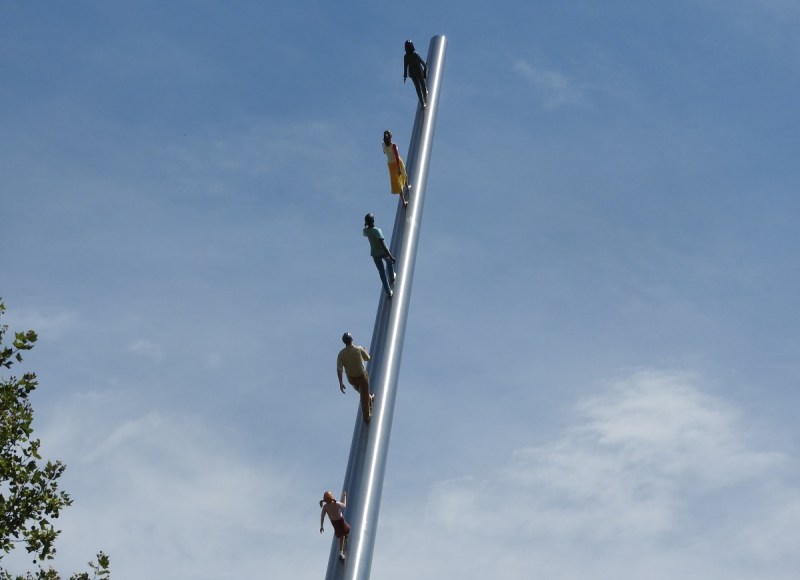
Above: Art on the Carnegie Mellon campus.
GamesBeat: It’s hard for them to ship something that doesn’t have one of those flaws you pointed out.
Schell: In some ways, I feel like AR right now is where VR was in the ‘90s. It was possible. We could build it. But for it to be really good, it was too expensive to be practical. It took 20 years to become practical. [There are] a lot of challenges.
GamesBeat: The approach, then — do you put five people on it to experiment or find a patron, somebody who’ll finance a larger team and doesn’t care about an investment return? Like the platform companies. They just want to push innovation forward.
Schell: We’ll do some of that. For example, we did a game for the Google Tango. We didn’t look at the Google Tango and say, “In a short term, this will be a hit.” There was no way it could be. But Google funded us. “Hey, see if you can do something pretty cool.” We did this domino game, and it is pretty cool. We do get some projects where people say, “Help us with this cutting-edge thing.” Same with Daydream. We did this Lego game for Daydream. Then, we get other people who’ve made their own hardware, which is a similar thing. “Can you help us get in early before there’s a market?” That’s a nice piece of it.
But then, you have entertainment companies who see something out there, and they want to get in somewhere. The problem is, right now in AR and VR, the big gaming studios don’t have expertise in it. The big entertainment companies can’t go to them because they don’t know anything about it. You have all these garage guys who know something, but if you have a world-class IP, do you trust it to three guys in a garage in order to make a meaningful experience? It’s a good position for us, to be a stable company with expertise in this stuff. It’s brought a lot of world-class folks to our door because they don’t know where else to go. That’s gone well for us.
GamesBeat: Paul Bettner’s Playful company, the original team that made Words with Friends, they have this VR company that made Lucky’s Tale. They have a team of 60 people, and they’ve raised money, but they’re all in on VR. Then, they looked at the opportunities they had and turned Lucky’s Tale into a 2D-screen platform. The VR platform got everyone excited, but it turns out that the Xbox One might be their biggest opportunity for sales.
Schell: The things we’re looking at right now — ultimately, for VR, social is going to be what drives sales. The problem is you have a network externality problem because the number of people is limited. The thing I always say is, until you have 10 million customers on a platform, you have significant network externality issues to overcome. It’ll be a while until we’re at 10 million for VR.
What we’re looking at now are games that are social and that are VR — but can also be PC. The PC players can interact with the VR players. It just happens that the VR players are way cooler because they’re more expressive. They maybe have more powers. This way, you can get your millions of players but also have a deluxe VR experience at the same time.

Above: Schell Games has made a wide range of games in its history.
I think, if there’s going to be a breakthrough title — I think VR is looking for its Space Invaders. It wasn’t until I really started looking at video game history that I understood how important Space Invaders was. Before Space Invaders, arcade owners didn’t believe in video games. They had them sometimes, but they weren’t earners, not as much as pinball machines. Then, Space Invaders comes out, and suddenly, it’s earning five times what a pinball machine earns. Then, the operators fall in love and tell the industry, “C’mon, guys, we need more stuff like this.” That was a watershed moment.
Here’s the part I didn’t fully appreciate. At the same time all that was happening, home consoles had been out. The Fairchild Channel F was out. The Atari VCS was out. But they weren’t doing well. These things were not received with open arms. “This is pretty expensive. Is it really better than Pong? I don’t know.” Then, Space Invaders happened, and not only did that change the arcade world, but at that moment, suddenly, the world is in love with video games, and the home consoles take off.
It’s weird. The knee in the curve for the Atari 2600 was a Japanese arcade game. Suddenly, Atari was popular. And then, very wisely, they did the first video game licensing deal to make Space Invaders, and that really changed things. But I feel like that’s where VR is now. We’re waiting for that Space Invaders moment, that thing that makes people really fall in love with it.
For that to come, it’s going to need to be cheap. It’s going to need to be on a very accessible platform. It’s going to need to be social. I feel like, probably, something social that crosses over with the PC — and possible mobile and console — is going to be the key.
GamesBeat: It seems like that observation would be good for your next talk. Look back at the past and see where that brings you.
Schell: Right! We’re doing a lot of planning right now. We had I Expect You to Die out, and we’re trying an experiment with putting out new content for it. Not at extra expense, just juicing up what’s already there. We’ll see what that does. Does that build buzz and make more sales? But right now, we’re doing a lot of planning for what exactly we’re building in 2018. We have some ideas, but we’re still pulling it together.

Above: Carnegie Mellon’s soccer field.
GamesBeat: Is licensed IP a good idea at some point?
Schell: It could be. It’s a tough choice. When you do your own stuff, the licensed IP can help you if you get the right thing, but on the flip side, if you’re building something you believe in, it’s such an opportunity to actually own something.
GamesBeat: People get more excited about it.
Schell: Well, they can get excited either way. We’re working on some IP right now where people are really pumped to work on them. We’re trying to figure that out. It’s an exciting time. It’s always nice seeing things blossom and change. I think we’re going to see a lot of that.
GamesBeat: It seems like another important time to gather intelligence in the industry. What’s going on with Atari? How much VR is Microsoft going to do? What’s Oculus up to next year?
Schell: Right. Is Nintendo doing anything interesting? A lot of mysteries right now. A lot of opportunity. Apple, what’s Apple doing? Do they have a headset on its way? A lot of possibilities.
GamesBeat: You’ve done these inspiring talks in front of the industry. Do you have a different take when you’re talking to your own team?
Schell: I don’t know. I don’t usually have to work very much to inspire my team. It’s usually the work itself that gets everyone excited. They’re glad to hear if we’re putting good support behind it. If I really believe in something, people are pleased to hear about that. But it’s not quite the same.
GamesBeat: What about in your classes?
Schell: There are always jokes and things. The thing about jokes is — I had another professor explain this to me. I never really understood it before. The reason you want to have humor in any kind of lecture, it’s partly because people like humor. That makes it more likable. But the real reason is that — when the first joke happens, everyone around you laughs. The presence of the audience is very important. There’s all this psychology about what it means to be part of an audience. I think people don’t fully comprehend that. An audience acts like a satellite dish. You use the audience, so you can pay attention better. If everyone in the audience is laughing, and you didn’t get the joke, you know you missed something, and now, you want to pay closer attention.
But the key thing with humor is, when the first joke happens, it makes you anticipate future jokes. You don’t want to miss them. To get a joke, you have to pay a certain level of attention. So, your mind starts paying attention in a way that it wouldn’t otherwise. That’s why you have the old saying about starting your talk with a joke. It makes people pay attention. The problem is, if they anticipate jokes and no more jokes come, you disappoint them. But if you can punctuate with humor all the way along in the right places, it can be very effective.
For us, me giving talks is a huge part of what makes the company work. We get a lot of our inbound business development that way. Someone sees me give a talk somewhere, they want to know more about what we do, and that ends up leading to a million-dollar project. Those end up being important. Fortunately, it’s something I’ve been fairly successful at.
GamesBeat: The humor makes it memorable, too. It’s easier for people to remember the point you made because they remember the joke.
Schell: Right. Humor often goes well with futurism because futurism is all about the unexpected, and humor is all about the unexpected. When you’re thinking those things through, a lot of naturally funny things happen there. It’s exhausting, but putting together talks like that can be fun.

Above: Jesse Schell and David Perry at the DICE Awards.
GamesBeat: Where do you think you want to take Schell Games? Where do you want to see Pittsburgh move in the future?
Schell: Pittsburgh is clicking along nicely. Carnegie Mellon continues to thrive. The Entertainment Technology Center has been in a real groove for quite some time. I feel like we’re continuing to do that well. The nice thing for the ETC is — we started out as kind of an island, and now, we’re moving in to be more fused with the campus. You’ll see when you visit the office. It’s way off campus, down by the river. That was great for getting it established, but at this point, I think we gain a lot more by having more active collaboration. We’ve had some, but it’s hard to do at a distance. We’re all hoping we can move back up on campus and work with robotics and a lot of these other groups we don’t normally work with.
What Pittsburgh needs are some hits in the tech space. If we have a couple hits here, where someone brings in millions and billions, that’ll turn things around. We’ve had some. One of the biggest ones for the city has been University of Pittsburgh Medical Center. That’s been a huge impact on Pittsburgh. They’re a major insurer. One of these big buildings down here is all theirs. Because they’ve been so successful, that’s created a lot of med tech stuff here.
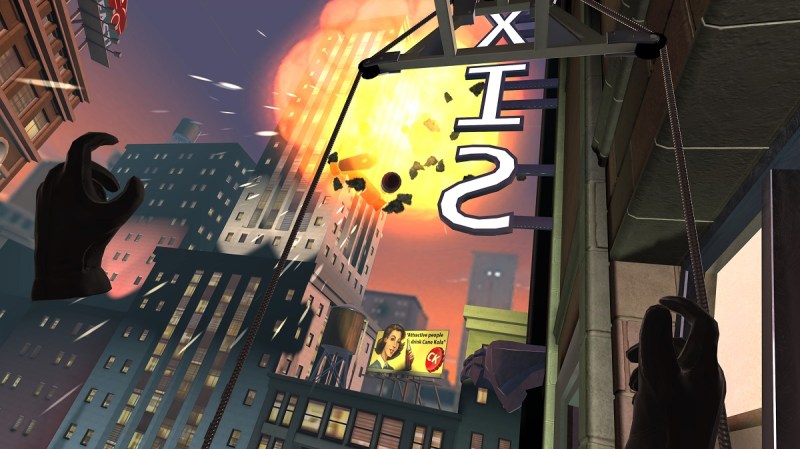
Above: Schell Games made I Expect You to Die for the Oculus Rift.
For Schell Games, the next step — we’ve done a nice job building a stable company, doing great work, doing some cutting-edge projects. I feel like we’re well established when it comes to doing work for hire. But we’ve never created our own hit. We’ve created some IP of our own, and some of it’s done OK, but none of it’s been a mega-hit.
We’re focused on how can we make something that builds a strong relationship with a player base? We’re not thinking about it so much as, “Let’s make a hit,” or “Let’s sell so many units.” It’s about, “What can we do that creates this loop for players where they really care?”
When I worked on Toontown Online, that was one thing that really worked out. Toontown shut, I forget, four or five years ago? Which was very sad. But the fans took over with pirate code and just put it back up themselves. That happens with a lot of MMOs, but I don’t think I’ve seen one like this. Those guys just crossed their millionth login. They have a million individual accounts. This weekend is the ReplayFX retro gaming festival. The Toontown guys will have their third Toontown Online fan festival for a game that went out of business five years ago because they care so much about that game.
That’s what we’re looking to do. We’re looking to do something that really creates that kind of relationship.

